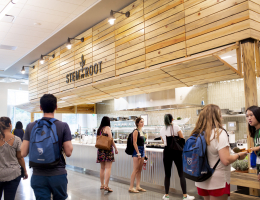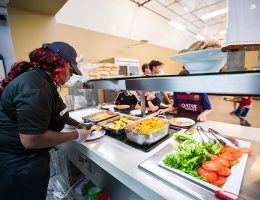Dining Operations Highlights
Emory and Oxford Dining strive to support a sustainable local food system, from farm all the way to food recovery. Throughout its operations, Emory Dining demonstrates its commitments to sustainable and local sourcing, to staff welfare and wages, to featuring plant-based meal options every day, and to waste reduction and recovery.
Currently, Emory and Oxford Dining source almost 40% of their food locally and/or sustainably, pay $14.25 per hour as a minimum rate of pay, and compost or recover all food waste leaving their facilities.
Dining Operations Benefits
- Emory supports local farms and producers whenever possible. Dining currently purchases food items from over 20 local growers and producers. With the introduction of the Working Farms Fund partnership, that number will increase to at least 70 growers by 2040.
- In line with Emory’s commitment to fair compensation for all employees and contractors, all Emory and Oxford Dining employees receive an hourly wage above the current federal poverty level, plus benefits such as health insurance, retirement plans, and eligibility for a free sustainable commute transit pass.
- Emory Dining and the Office of Sustainability Initiatives co-manage the weekly Emory Farmers Market which connects over 20 seasonal, local small business owners and farmers to the Emory community.
- Emory prioritizes food waste reduction and recovery in order to reduce its environmental impacts and get food to hungry people. Each semester, Emory Food Chain recovers between 2000 and 3000 pounds of safe, edible food from Emory and Oxford Dining and donates it to community organizations. Emory and Oxford Dining also implement pre- and post-composting throughout all stages of dining operations.
- Slow Food Emory provides a food recovery program for students and staff at Emory. They provide packaged and untouched free surplus food from the DCT Fire and Spice Station every Wednesday from 10:00 pm – 11:00 pm. To learn more, join the Slow Food Emory GroupMe.
How It Works
Production:
- Emory follows a robust set of guidelines for sustainably sourcing food that are utilized by the chefs when purchasing ingredients for menus and are updated frequently by the Sustainable Food Committee to incorporate latest research and practices in sustainable production.
- Emory’s new partnership with The Conservation Fund’s Working Farms Fund will boost the supply of fresh, sustainably grown food by working to overcome barriers for next-generation farmers in the metro Atlanta area. Read more here and watch the webinar, “Taking Action for America’s Local Food,” to learn more about the partnership.
Transportation:
- Local food purchasing is a major component of Emory’s Sustainable Food Guidelines, since buying locally often reduces fossil fuel for transport, generates less waste, and offers fresher food for diners. Almost 40 percent of the food served in Emory and Oxford Dining locations is sourced locally and/or sustainably.
Preparation:
- Staff are trained on stem-to-root cooking and preparing food from scratch in small batches, creating healthier meals and reducing food waste.
- The Imperfectly Delicious Produce program, run by Emory’s food service provider, rescues cosmetically-challenged produce from farms small and large and finds creative ways to incorporate the produce into menus.
Dining Experience:
- Emory Dining serves plentiful, plant-based options daily to reduce the carbon footprint of served meals and to provide meal options for all diet preferences and restrictions. A vegan Stem-to-Root Station is front and center when entering the newest Dining facility, the Dobbs Common Table.
- Emory Dining takes numerous steps throughout its operations to reduce energy and water use, including complying with LEED building and energy-saving standards for all new facilities and kitchen equipment purchases, “Low Flow” flush devices on toilets, automatic light timers that turn off when not in use, and automatic on/off switches on hand sinks.
Waste Management and Recovery:
- As part of Emory’s goal to divert 95 percent of its waste from municipal landfills by 2025, the University implemented a Waste Management Policy which includes composting and recycling in all buildings. To help diners sort their waste, all to-go ware is either compostable or recyclable.
- Emory Dining collaborates with Emory Food Chain, a student group, to recover unused food from events and dining facilities and donating it to local food banks.
- Used fryer oil is converted into biodiesel to fuel the Emory Cliff Shuttles.




